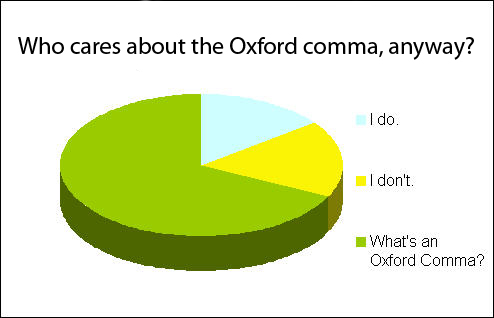Oxford Drops Oxford Comma
Oxford University has dropped the Oxford comma! A dark day for humanity.
Oxford University has dropped the Oxford comma!
In its “branding toolkit,” it offers the following advice:
As a general rule, do not use the serial/Oxford comma: so write ‘a, b and c’ not ‘a, b, and c’. But when a comma would assist in the meaning of the sentence or helps to resolve ambiguity, it can be used – especially where one of the items in the list is already joined by ‘and’:
They had a choice between croissants, bacon and eggs, and muesli.
GalleyCat’s Jason Boog notes, though, that the Oxford University Press, which is commercially and editorially autonomous, has not made the switch.
This is a distressing trend. While omitting the trailing comma in a series often doesn’t change the meaning, it sometimes does with hilarious results. We would avoid these gaffes by routinely using the Oxford comma, rather than hoping people remember to add them in when ambiguity would be created.
via Brian Fung







Can somebody explain to me a clarity-rationale for not having that comma in there? There are instances where leaving the comma out ads confusion. What instances does putting it in add confusion?
Trumwill:
It’s better for the environment.
I’ve always followed the practice that Oxford is now adopting. I can think of two reasons why I do that: 1) I was taught to write that way, and B) since I try to write how I speak, it sounds more natural to my brain’s internal ear to leave out the serial comma, unless including it ehances understanding as in the bacon and eggs example.
I’m not saying “these reasons are why you should quit using the Oxford comma,” just that they’re my reasons for writing the way I do.
Oxford commas suck. They’re redundant. They drink all your liquor, flick cigar ashes on the carpet and don’t even flush when they use the can. Good riddance to bad punctuation!
The Oxford comma is largely unnecessary and harmless, but what is really important is consistent style. Know your style manual and follow it consistently. Where I work, we use a slightly modified version of AP style, which does not use the Oxford comma. Before that, I was a Strunk and White man, which does mandate the use of the Oxford comma.
I was taught the serial comma and continue to use it. I find that in my sentence constructions, the comma is usually necessary for the sake of clarity. It’s more convenient to stick with one rule than to keep going back and forth based on whether it’s absolutely necessary in the end.
As for the why, the Brits seem to be moving away from superfluous punctuation marks in general. Honorifics such as Mr and Dr are written without the periods we use in AmE.
Wiki has an interesting article on this subject. They use as an example of introduced ambiguity (in both the leaving out and putting in case), a book dedication:
Without the comma, one could conclude that the author claims Ayn Rand and God as parents. This would be resolved by use of the comma.
If, however, the dedication reads:
One could read Ayn Rand as being in apposition to mother, hence claiming her as mother. Omitting the comma in this case would resolve the matter.
@Tano: A solution (the one I would use in this circumstance) to which would be:
Meaning, there are usually more (and sometimes better) ways to remove ambiguities than by adding or omitting commas.
@Boyd: Yes, you beat me to it. In this case, rewriting the clause is the only way to truly avoid confusion. Presumably, the author’s mother meant more to her than God or Ayn Rand and your rewrite does change the hierarchy.
Not clear in any order: Why someone would dedicate a book to both God and Rand, given that Rand was a devout atheist.
Larry, Curley and Moe, and Shemp and Joe!!!
Yuk, yuk and yuk and, yuk, yuk!!!
Then there’s the panda who eats, shoots, and leaves.
Curly. AGHHHHH!!!
This is why lists should always be enclosed in square brackets:
“Dedicated to [my parents, Ayn Rand, God].’ or, if you really were the offspring of Rand having sex with God: “to my parents [Ayn Rand, God]”.
Software engineers never have a problem doing things this way.
I’m thinking I’d do it this way, Michael:
public string dedicatees[] = ["parents", "Ayn Rand", "God"];public Dedication dedication = new Dedication(dedicatees);
Presuming the appropriate constructor definition, of course. 😉
One could read Ayn Rand as being in apposition to mother, hence claiming her as mother. Omitting the comma in this case would resolve the matter.
Well drat. That does make it less black and white than I had thought.
Boyd, thanks for reminding my when I love Python so much.
And what if you are thanking a whole list of people, some of whom need qualifiers?
Anyway, I was taught to use the comma and was later shown that it reduced confusion, so I’m going to stick with it. I don’t care what Oxford, Boyd, and mantis say.
Franklin, that’s he best part, the square brackets can be nested:
“Dedicated to: [my parents [Bob, Alice], Ayn Rand, God]”
While I appreciate the software engineer approach, since I’m one myself, I’m not sure if the public at large is big on nested brackets. I once used nested parenthesis in a college English paper that was intended to be funny. The teacher wasn’t impressed.
Jesus Christ how many times am I going to have to read Ayn Rand’s name today??